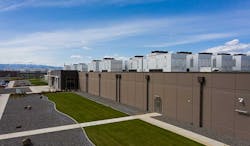Building data centers is a capital-intensive business. The explosive growth of digital infrastructure has been enabled by driven by access to affordable capital. One of the enablers of this cheap capital has been strategies that use securitization to reduce both lender risk and interest rates for borrowers.
Sabey Data Centers is among the developers that has used securitized borrowing to fund its growth. This week Sabey issued $175 million of securitized notes paying a fixed rate of just 1.88 percent. Last year Sabey used a similar approach to borrow $800 million, meaning the Seattle-based company has used secured financing to lined up nearly $1 billion for data center construction.
“Efficient access to capital markets through this ABS platform will allow Sabey to continue to cost-effectively finance customer driven expansion for years to come,” said Patty Sewell, Chief Financial Officer for Sabey Corporation.
Sabey Data Centers is a joint venture between Sabey Corporation and National Real Estate Advisors (NREA). The company operates more than 3 million square feet of mission-critical space, making it one of the largest privately-held multi-tenant data center operators in the United States, with campuses in Northern Virginia (Ashburn), Manhattan and three sites across the Pacific Northwest.
Sabey’s ABS loans are an example of how the growing maturity of data center finance matters. In the world of digital infrastructure, arcane lending strategies translate into the construction of massive server farms that power the Internet.
Robert Rockwood, the President of Sabey Data Centers, said the new financing “allows us to continue to grow as we bring the industry’s best and most sustainable data center solutions to the world’s most demanding data center customers.”
How Securitization Works
In a securitization financing, a company creates a security based on the creditworthiness of a specific pool of assets, rather than the entire company. Data center developers can issue debt notes backed by cash flow from operational data centers, which are leased by some of the world’s largest and most credit-worthy companies. That tenant credit quality enables the issuer to pay lower interest rates on its debt, which reduces its costs as it seeks to compete and build additional facilities.
Sabey isn’t alone in using securitization to fund data center development, as Vantage Data Centers (Digital Bridge) and STACK Infrastructure have also used this strategy.
Both of Sabey’s transactions have used an asset-backed securitization (ABS) platform from Guggenheim, and the notes earned an investment grade A+ rating from Standard & Poor’s. Rockwood said Sabey had “delivered results well ahead of projections since our initial transaction” in 2020.
“We place high value on the partnership that we have developed with Guggenheim Securities who acted as sole structuring advisor and sole book-running manager on the transaction,” said Sewell, who added that the note were “extremely well received by the market representing the quickest marketing timeframe for the sector.”
The Sabey funding is yet another example of the influx of fresh investment into the data center sector, which has become a favored destination from large global financial firms as the growth of the digital economy attracts investment dollars.
Sabey’s finance team has also been busy in refinancing one of its premier properties.
Real estate news sources report that Sabey and National Real Estate Advisors have secured a $250 million refinancing deal for Intergate.Manhattan, the former Verizon office tower at 375 Pearl Street. Wells Fargo and JPMorgan reportedly provided CMBS refinancing for a 16-floor office condominium at the 32-story property, which incudes both office and data center space.
About the Author



